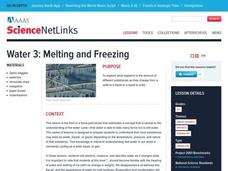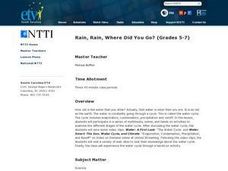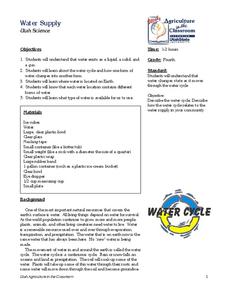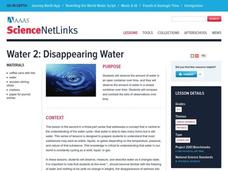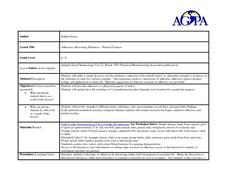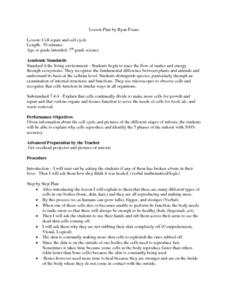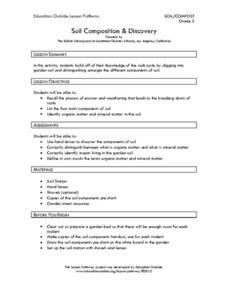Curated OER
Plants and the Water Cycle
Students study the role of plants in recycling water by collecting water vapor that is emitted, or transpired, by green plant leaves. They collect and measure the water that transpires through the tiny pores of plant leaves. Afterwards,...
Curated OER
Matter, Matter, Everywhere!
Eighth graders make inquiry about the existence of matter. A definition of the word is needed before students can engage in various activities. The application of knowing about matter is done in the working of experiments.
Curated OER
Doin' The Moonwalk
If you are looking for an outstanding lesson on the Moon for your budding astronomers, look no further! This outstanding plan is full of wonderful, meaningful activities for your charges to engage in. Pupils will discover why there are...
Curated OER
Microbial Influence on Earth's Systems
Learners identify the different biogeochemical cycles on Earth. In this biology lesson, students observe microbes under a microscope. They compare and contrast respiration and photosynthesis.
Curated OER
Stream Ecology In Wisconsin and Puerto Rico
Students identify the different types of water and explain in what proportions they exist on Earth. They identify and correctly label the parts of the water cycle and how these parts interact with each other. Students identify the...
Curated OER
Melting and Freezing
Students explore how various substances change from a solid to a liquid or from a liquid to a solid and how temperature, pressure and nature play an important role in this process. In this melting and freezing lesson,...
Curated OER
Rain, Rain, Where Did You Go?
Students study the water cycle including condensation, evaporation, and precipitation. In this water cycle lesson plan, students watch a video and access assigned web sites to investigate the water cycle. They complete an experiment with...
Curated OER
Water Supply
Fourth graders complete three activities. In this water supply lesson, 4th graders learn that water can exist in different forms and watch a demonstration of each form. Students explore the water cycle and make a water cycle using the...
Curated OER
A Rock’n Earth
Seventh graders identify the three types of rocks. In this earth science lesson, 7th graders model the rock cycle using crayon shaving. They explain how rocks change as they go through the cycle.
Curated OER
Gettysburg Rocks Recycle to Win
Eighth graders use a geologic cross section to study the rock cycle of the Gettysburg battlefield. In this rock cycle lesson plan, 8th graders connect the rock cycle and continental rifting.
Curated OER
Disappearing Water
Students explore the water cycle. In this earth science instructional activity, students observe and measure water in a closed container and in an open container. Students record their observations and compare their sets of data to draw...
Curated OER
Adhesives: Measuring Stickiness
Learners test the stickiness of natural substances. For this adhesion as a property of matter lesson, students build a tool to test the adhesion of natural "glues" such as honey, peanut butter, flour and water paste, and jelly. ...
Curated OER
The Bending and Bouncing of Light
Students investigate refraction and reflection of light. In this light lesson, students perform 3 activities to observe light interacting with matter by using a flashlight. They explore refraction using a glass of water and reflection...
Beyond Benign
Puzzler
Are some packaging materials superior to others? Using sustainability as a guide, scholars analyze different packing materials to describe their life cycles. They create puzzles to communicate their findings.
MENSA Education & Research Foundation
Ecosystems
Explore the Earth's different ecosystems through four lessons, an assessment, and extension activities. Lessons include informative text and step-by-step instructions to apply knowledge in interactive, and thought provoking ways; such as...
Channel Islands Film
Human Impact on the Food Web of Santa Cruz Island
What happens when a non-native species is introduced onto an island? Santa Cruz Island, part of the Channel Island chain located off the coast of southern California, provides the perfect laboratory for young environmental scientists to...
Curated OER
Water Cycle Activity
Learners build a model and observe the cycle of evaporation and condensation that occurs in the water cycle. They see how the water cycle works, such as water condensing on the side of the jar and drops precipitating into rain that...
Curated OER
What's the Matter with My Snow?
Young scholars collect snow samples around their school. They explore the concepts of density and phase change as well as the math skills of measurement and statistics. Students explore the water cycle through an interactive, down...
Curated OER
The Water Cycle
First graders investigate the different stages of the water cycle. They conduct Internet research and complete a water cycle WebQuest. Students identify what happens at each stage of the water cycle, and write about each stage in their...
Curated OER
Cell Repair and Cell Cycle
Seventh graders explore the cell cycle. They view pictures of different stages of mitosis and explain why cells reproduce. They identify the five phases of mitosis: interphase, prophase, metaphase, anaphase, and telophase.
Curated OER
The Water Cycle and Watershed
Students summarize the steps in the water cycle. For this earth science lesson, students create a skit, song or poem showing the various components of the cycle. They identify the different watersheds in their area.
Curated OER
The Water We Drink
Third graders relate that the quality of their drinking water is subject to the condition of the environment and water found in streams and creeks in their community. They track the travel of a wad of paper from a student's desk to a...
Education Outside
Soil Composition & Discovery
Organic or mineral? How does the matter matter? Second graders use their knowledge of the rock cycle to label the different components in garden soil.
Curated OER
Alternative Energy
Students discover the different alternative fuel sources. In this biology lesson, students identify the different stages of the carbon cycle. They explain the pros and cons of using alternative energy.





